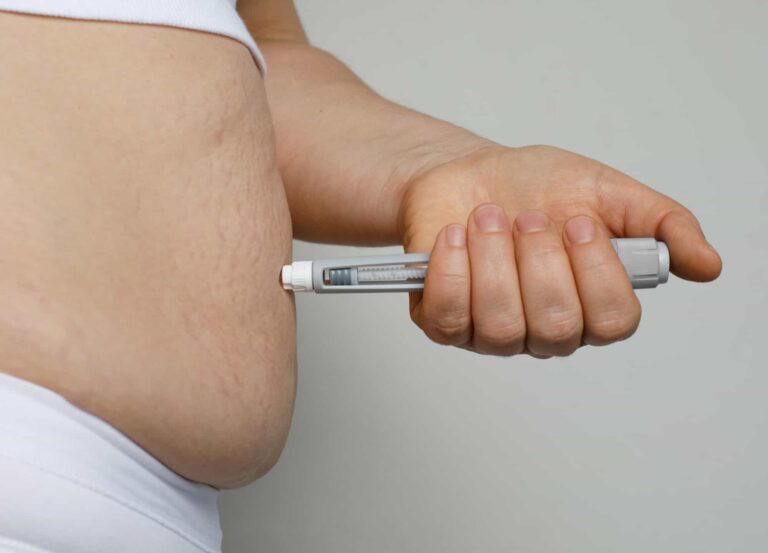Emily* was 16 when she began begging her parents for a nose job to fix what she saw as an enormous deformity—and what those closest to her described as a tiny, barely there bump. No one had ever made fun of her appearance, yet she was convinced her nose was the reason behind a crush not reciprocating feelings, a friend not inviting her out on a weekend or someone cropping her out of a photo. “It was all I talked about at the time,” she says.
Her mom wasn’t against the idea of plastic surgery—she’d had it herself, and it was common for teens in Los Angeles, where they lived, to get nose jobs in high school—she just could not understand how Emily was seeing something so different from reality. A year later, she agreed to take her daughter to a consultation with a plastic surgeon. “She just wanted to shut me up, because I was relentless,” says Emily. The doctor said that her nose was perfectly proportional for her face and he didn’t feel comfortable shaving it down. Another doctor they visited a few weeks after said the same and expressed some concern over her extreme fixation.
“Around the same time, I was also developing all these little compulsive habits—counting to certain numbers, plugging things in and out over and over again. They weren’t taking over my life, so I didn’t even really notice them, but my parents and friends did,” says Emily, who is now 30. Her mom took her to a specialist, who diagnosed her with OCD and put her on Zoloft. “Within a month or two of getting the dosage right, my thoughts around my nose just kind of normalized and stopped consuming me,” says Emily. Looking back, she’s grateful the doctors refused to operate on her. “I realize that I didn’t need a smaller nose, just a prescription,” she laughs.
Related: 5 Common Reasons Plastic Surgeons Will Refuse to Operate On You
Dr. Evan Rieder, a board-certified dermatologist and psychiatrist in New York City, says that often, there is a psychological overlay to the issues people have with their image that isn’t addressed during consultations and treatment. It’s easier, in some ways, to understand why a visible skin condition like cystic acne, rosacea or vitiligo might cause anxiety or depression, but understanding and diagnosing someone who has compulsive thoughts or body dysmorphic disorder (BDD) is trickier.
“There are people who can have a logical conversation with you and say, ‘You know what, my nose is a little big and I would like to get it fixed, but it’s not ruining my life and it’s not the worst thing in the world,’” Dr. Rieder says. “On the opposite end of the spectrum, there are people who, when you’re looking at them, you’re not seeing anything wrong, but they have some sort of repetitive behavior that they’re doing at home—whether that’s going in front of the mirror for several hours a day, comparing their appearance to that of celebrities or their peers to such a point where they’re not working or going out socially, or even not going outside in the daylight at all without wearing incredible amounts of makeup.” It requires doctors to step back and figure out how much time people spend thinking about this perceived or invisible defect and how it’s affecting their day-to-day functioning, he says.
According to Dr. Melissa Doft, a plastic surgeon in New York City, doctors are taught in school to watch out for these mental health clues—but, she says, “there are definitely a lot of doctors out there who prey on insecure patients rather than really getting to the bottom of the issue.” With Instagram and editing apps like Facetune, Dr. Doft says, it’s becoming harder now to tease out who is “just a normal millennial and who has body dysmorphic disorder.” She thinks social media is pushing more young people toward considering surgery they don’t need and leading them to believe that having different breasts or features will make them happier. “It’s not as straightforward these days to determine [patient motivation],” she says.
Related: Will Instagram’s New “Cosmetic Surgery Ban” Actually Change Anything?
A responsible doctor will take into account a patient’s full mental health history before proceeding with an elective operation, which is why the intake form is so crucial. Doctors don’t just want to know if you’re on blood thinners or heart medications that could interfere with invasive surgery, they want to get a fuller picture of your well-being. If someone takes medication for depression or anxiety, “I ask why they’re on it, who prescribes it and how long they’ve been on it,” says Dr. Doft. “If they have depression, have they ever been hospitalized for it? Have they ever thought about hurting themselves? You really want to get a little bit longer history of what people have gone through.”
That isn’t to say that simply having a mental health disorder diagnosis is a red flag or closes the book on your chance for plastic surgery—just that your doctor will probe a bit further to determine how stable you are.
Mackenzie, a 26-year-old mother of three, was diagnosed with clinical depression when she was 11 and has been in and out of therapy since. “My parents got divorced when I was younger and my two sisters both modeled, so I was always looking for a way to be the best,” she says. “I wanted to be perfect and attractive to others, since I didn’t feel wanted enough by my family.”
At 18, Mackenzie got pregnant with her first child and had to stop taking the antidepressants she’d been on for the previous six years. “My hormones during pregnancy were perfect, but they went crazy as soon as I wasn’t,” she says. Each of her three pregnancies took a toll as much on her body as they did her mental health—she developed PCOS and muscle separation that disintegrated the ligaments in her hip and spine curvature, in addition to severe postpartum depression like nothing she’d ever experienced. “I felt absolutely terrible physically, and I didn’t look the way I wanted. I didn’t feel like I could live or see anyone or do anything,” she says.
She went back to therapy and discussed getting a mommy makeover. “My therapist was tentatively optimistic about it. She knew there was definitely the risk of it not changing how I felt or changing [things] for the worse, but knowing my history of how I viewed myself, she thought it would probably be helpful.” Mackenzie went back and forth with the decision but ultimately figured that if nothing else, getting surgery to repair the muscle damage would at least help her walk and be more comfortable. She got the mommy makeover procedure—in her case, a breast augmentation with fat transfer and rebuilding of the stomach wall—in July.
“After the surgery, the pain was intense and I was freaking about the progress and my body looking weird if I gained weight, so I was very depressed for a couple of months,” says Mackenzie. Today though, she says the difference she sees is huge. “I’m not going to say it cured my depression, but I can wear clothes without hiding and feel much better about myself when I go up and talk to people.”
Generally speaking, struggling with depression, anxiety and low self-esteem doesn’t necessarily make someone a poor candidate for plastic surgery, but it does require a more thorough managing of expectations. “You can’t make an unhappy person happy with surgery, but you can correct something that is making them self-conscious and give them more confidence,” says Dr. Doft. “It’s a narrow change, but there is a difference.”
*Name has been changed to protect privacy.











